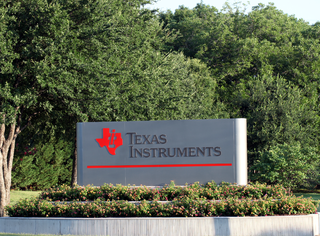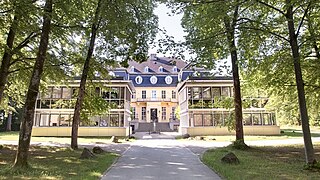Related Research Articles

Nokia Corporation is a Finnish multinational telecommunications, information technology, and consumer electronics corporation, established in 1865. Nokia's main headquarters are in Espoo, Finland, in the Helsinki metropolitan area, but the company's actual roots are in the Tampere region of Pirkanmaa. In 2020, Nokia employed approximately 92,000 people across over 100 countries, did business in more than 130 countries, and reported annual revenues of around €23 billion. Nokia is a public limited company listed on the Nasdaq Helsinki and New York Stock Exchange. It was the world's 415th-largest company measured by 2016 revenues, according to the Fortune Global 500, having peaked at 85th place in 2009. It is a component of the Euro Stoxx 50 stock market index.

Texas Instruments Incorporated (TI) is an American semiconductor company headquartered in Dallas, Texas that designs and manufactures semiconductors and various integrated circuits. It is one of the top 10 semiconductor companies worldwide based on sales volume. The company's focus is on developing analog chips and embedded processors, which account for more than 80% of its revenue. TI also produces TI digital light processing technology and education technology products including calculators, microcontrollers, and multi-core processors. The company holds 45,000 patents worldwide as of 2016.

Unisys Corporation is an American multinational information technology (IT) services and consulting company founded in 1986 and headquartered in Blue Bell, Pennsylvania. The company provides digital workplace, cloud applications & infrastructure, enterprise computing, business process, AI technology and data analytics services.

A mobile game is a video game that is typically played on a mobile phone. The term also refers to all games that are played on any portable device, including from mobile phone, tablet, PDA to handheld game console, portable media player or graphing calculator, with and without network availability. The earliest known game on a mobile phone was a Tetris variant on the Hagenuk MT-2000 device from 1994.

Radvision was a provider of video conferencing solution and enabling products for IP communication developers based in Tel Aviv, Israel. Radvision was acquired by Avaya in June 2012. Spirent Communications acquired Radvision's Technology Business Unit from Avaya in July 2014, to become Spirent Developer Tools Business Unit.

Alcatel–Lucent S.A. was a multinational telecommunications equipment company, headquartered in Boulogne-Billancourt, France. It was formed in 2006 by the merger of France-based Alcatel and U.S.-based Lucent, the latter being a successor of AT&T's Western Electric and a holding company of Bell Labs.
Opposition to software patents is widespread in the free software community. In response, various mechanisms have been tried to defuse the perceived problem.
Intangible asset finance, also known as "IP finance", is the branch of finance that uses intangible assets such as intellectual property and reputation to gain access to credit. Like other areas of finance, intangible asset finance is concerned with the interdependence of value, risk, and time.

TiVo Inc. was an American corporation with its primary product being its eponymous digital video recorder. While primarily operating in the United States, TiVO also operated in Australia, Canada, Mexico, New Zealand, Puerto Rico, Taiwan, the United Kingdom, and Western Europe. On September 8, 2016, TiVo Inc. was acquired by Rovi Corporation. The new entity became known as TiVo Corporation, which in turn, merged with Xperi in December 2019.

WebM is an audiovisual media file format. It is primarily intended to offer a royalty-free alternative to use in the HTML5 video and the HTML5 audio elements. It has a sister project, WebP, for images. The development of the format is sponsored by Google, and the corresponding software is distributed under a BSD license.
Keith Daniel Bergelt is an American corporate executive and former U.S. diplomat. He is CEO of Open Invention Network where he is responsible for coordinating the establishment and maintenance of a patent ‘‘no-fly” zone around Linux. As such, he is responsible for safeguarding an open and competitive landscape in key technology markets such as back-office transaction processing, mission critical IT applications, mobile communications/smartphones, and desktop computing.

IPCom GmbH & Co. KG is a German intellectual property rights licensing and technology R&D company.
The smartphone wars or smartphone patents licensing and litigation refers to commercial struggles among smartphone manufacturers including Sony Mobile, Google, Apple Inc., Samsung, Microsoft, Nokia, Motorola, Huawei, LG Electronics, ZTE and HTC, by patent litigation and other means. The conflict is part of the wider "patent wars" between technology and software corporations.

Microsoft Lumia is a discontinued line of mobile devices that was originally designed and marketed by Nokia and later by Microsoft Mobile. Introduced in November 2011, the line was the result of a long-term partnership between Nokia and Microsoft—as such, Lumia smartphones run on Microsoft software, the Windows Phone operating system; and later the newer Windows 10 Mobile. The Lumia name is derived from the partitive plural form of the Finnish word lumi, meaning "snow".
Rockstar Consortium Inc., originally named Rockstar Bidco, is a consortium formed to negotiate licensing for patents acquired from the bankrupt multinational telecommunications and data networking equipment manufacturer Nortel. Members of the consortium are Apple Inc., BlackBerry, Ericsson, Microsoft, and Sony. Rockstar is a patent holding non-practicing entity (NPE) and submitted the winning US$4.5 billion bid for the Nortel patents at a week-long auction held in New York in June 2011.
A patent privateer or intellectual property privateer is a party, typically a patent assertion entity, authorized by another party, often a technology corporation, to use intellectual property to attack other operating companies. Privateering provides a way for companies to assert intellectual property against their competitors with a significantly reduced risk of retaliation and as a means for altering their competitive landscape. The strategy began with a handful of large operating companies. In April 2013, a group of technology companies asked the U.S. Department of Justice and the Federal Trade Commission to investigate the privateering strategy as an impediment to competition.

Microsoft Mobile Oy was a subsidiary of Microsoft involved in the development and manufacturing of mobile phones. Based in Espoo, Finland, it was established in 2014 following the acquisition of Nokia's Devices and Services division by Microsoft in a deal valued at €5.4 billion, which was completed in April 2014. Nokia's then-CEO, Stephen Elop, joined Microsoft as president of its Devices division following the acquisition, and the acquisition was part of Steve Ballmer's strategy to turn Microsoft into a "devices and services" company. Under a 10-year licensing agreement, Microsoft Mobile held rights to sell feature phones running the S30/S30+ platform under the Nokia brand.
Nokia is a Finnish multinational corporation founded on 12 May 1865 as a single paper mill operation. Through the 19th century the company expanded, branching into several different products. In 1967, the Nokia corporation was formed. In the late 20th century, the company took advantage of the increasing popularity of computer and mobile phones. However, increased competition and other market forces caused changes in Nokia's business arrangements. In 2014, Nokia's mobile phone business was sold to Microsoft.
Avanci is an operator of patent licensing platforms established in 2016 in the information and communications technology (ICT) space and more specifically in the Internet of things (IoT) and broadcast spaces. By licensing patents from multiple owners under a single agreement, Avanci provides licenses to standardized technologies for manufacturers in the IoT and broadcast industries. The company is based in Dallas, Texas, operating through offices in Dublin, Beijing, Tokyo, and Seoul.
References
- 1 2 3 "Kodak in Crisis Mines Patents for Cash Copying Texas Instruments". Texas Instruments. 2012-01-13. Retrieved 2012-01-15.
Texas Instruments, the second-largest U.S. chipmaker, wrote the template decades ago on techniques to exploit patent holdings when a company is struggling, said Joseph Siino, who runs patent-consulting firm Ovidian Group. Losing market share to competitors, Texas Instruments used an aggressive litigation strategy that extracted royalties from those using the Dallas- based company's technology without permission, he said.
- ↑ "TI Fact Sheet". Texas Instruments . Retrieved 2012-01-15.
- ↑ "How Texas Instruments Transformed the Eastern District of Texas". www.law.com. 2011-10-26. Retrieved 2012-01-15.
For the answer, rewind to the early 1990s. That's when Texas Instruments devised a money-making litigation strategy intended to ensure customers renewed their licensing agreements with the Dallas-based tech company or face a patent infringement suit(...). "Truthfully, TI is the one that really discovered the Eastern District and took advantage of it," says Carl Roth, who was a patent lawyer for TI during the 1990s. "TI, which was very aggressive in those days at enforcing their patent portfolio, ended up loving the Eastern District and filed 25 or 30 suits during the 1990s in the Eastern District"
- ↑ "Microsoft, LG Strike Android Patent Deal". InformationWeek. 2012-01-12. Retrieved 2012-01-15.
Microsoft said the deal with LG means that 70% of Android-based smartphones sold in the U.S. are now covered by its licensing program
- ↑ "Nokia Unlocks Significant Value With Microsoft Deal". Forbes. September 5, 2013. Retrieved 27 December 2013.
patent business.. is healthy and has been consistently generating cash flows of around Euro 500 million annually
- ↑ "Nokia Earnings: NSN And Patents Drive Value". NASDAQ. October 28, 2013. Retrieved 27 December 2013.
At the current run rate, Nokia's IP licensing arm generates about 500 million Euros in steady royalty income every year.
- ↑ Chung, Jili (2020-11-01). Innovation's Crouching Tiger. Ehgbooks. ISBN 1647840457.
- ↑ "Prospectus of Ant Group IPO" (PDF). Ant Group. 2020-11-27. Retrieved 2020-12-02.
- ↑ "Ant IP on Hold but a Great Showcase for IP Monetization". Innovation's Crouching Tiger. 2020-11-09. Retrieved 2020-12-02.